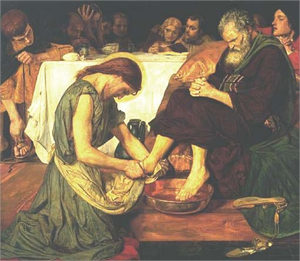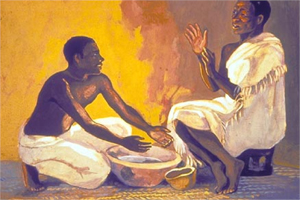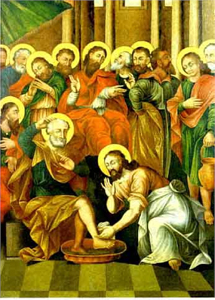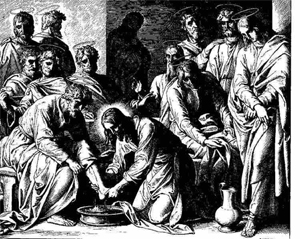
Christmas
Easter
Pentcoest
All Saints
Christ The King
Confirmation
Palm/Passion
Reformation
Stewardship
Books of the Bible
Lenten Series
Christmas Dramas
Videos
Series A - Matthew
Series B - Mark
Series C - Luke
Series D - Other
To contact
Edward F. Markquart
info@sfs.com
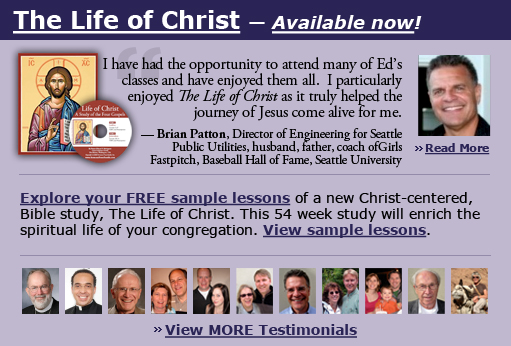
Series B The Footwashing Gospel Analysis John 13:1-20 The following Bible study is from a larger course entitled THE LIFE OF CHRIST: A Study in the Four Gospels. This 54 week course for the laity will be available for congregations in 2006. Basic text for the course: SYNOPSIS OF THE FOUR GOSPELS, Kurt Aland, English Edition, P. 281. #309. WASHING THE DISCIPLES’ FEET John 13:1-20 In the Gospel of John and its account of the events at the Last Supper, there is no mention of the Passover meal and Jesus giving the bread and wine, his body and blood. Instead, we have the story of the foot washing of the disciples’ feet. -Now before the festival of the Passover, Jesus knew that his hour had come to depart from this world and go to the Father. THE HOUR had finally come to Jesus’ life. He was beginning his last chapter here on earth, and it was going last for several long, grueling days. -Having loved his own who were in the world, he loved them to the end. The Apostle John wants us to know that Jesus loved him and the other disciples to the very end. His disciples were in the world but not of the world. -The devil had already put it into the heart of Judas son of Simon Iscariot to betray him. Once again, we are reminded that Judas Iscariot had given his heart to the prince of evil, the devil, the tempter, or whatever name you want to call that power within us that tries to seduce us away from God. Judas was going betray Jesus with a kiss. A question is for us today is: “How do we betray Jesus?” Each of us is different in our betrayal of Christ but there are basic theme common to all of us. A personal question is this: “How do you betray Jesus?” Answer that question privately in your minds. -And during supper Jesus, knowing that the Father had given all things into his hands, and that he had come from God and was going to God, Jesus was living out his God-given destiny, including the betrayal by Judas. Jesus had come to earth from God and now was going to leave this earth and return to God. That was THE plan. That was THE PLAN of God for Jesus all along. -He got up from the table, took off his outer robe, and tied a towel around himself. Jesus took off his outer garment and tied the towel of the servant girl around himself. -Then he poured water into a basin and began to wash the disciples’ feet and to wipe them with the towel that was tied around him. We recall the foot washing that is re-enacted here at Grace Lutheran each year on Holy Thursday. We recall the actions of Jesus during the foot washing e.g. wrapping the towel of a servant girl around his waist, pouring the water into a basin, washing the disciples’ feet, pausing and concentrating on Peter and his refusal to have his feet washed. The foot washing is very visual and is easy to remember. The foot washing is richly symbolic and it is easy to remember the meaning of the foot washing. That is, we are called to be humble and willing servants of others. We recall that at the last supper in the Gospel of John, there is only the foot washing and there is no record of the celebration of the Lord’s Supper/the Passover Meal/the first Holy Communion. THE event at the last supper in the John is the foot washing. We recall a famous teaching, “a picture is worth a thousand words.” In the event of the foot washing, Jesus was painting a picture of what it meant to be a servant. -He came to Simon Peter, who said to him, ‘Lord, are you going to wash my feet?’ You can feel the resistance of Peter. -Jesus answered, ‘You do not know now what I am doing, but later you will understand.’ Peter and the other disciples still “didn’t get it” that Jesus had come to be a servant and that disciples from every generation and culture would need to discover for themselves what it means to be a servant of Christ. -Peter said to him, ‘You will never wash my feet.’ Peter was opposed to Jesus washing his feet. It was not appropriate for a master to wash the feet of one of his students. -Jesus answered, ‘Unless I wash you, you have no share with me.’ This means, “Unless I wash you, you are not part of me, Peter.” The purpose of Christ is to wash all of his disciples’ feet, arms, legs, heart, eyes, hands. Jesus wants to make his disciples clean through out. All aspects of our lives are to be cleansed by his forgiveness and his washing away of our sins. -Simon Peter said to him, ‘Lord, not my feet only but also my hands and my head!’ Peter is finally getting into the swing of it. He is beginning to grasp that everything about him has been touched by sin. He begins to grasp that sin is corrosive of his whole being, his thoughts, his feelings, his sight, his touch, his heart, mind and soul. Peter is beginning to grasp that his whole self needs to be cleansed by Jesus. We also sense that is true for us. We sense that all aspects of ourselves need to be cleansed by the washing powers of Jesus. -Jesus said to him, ‘One who has bathed does not need to wash, except for the feet, but is entirely clean. And you are clean, though not all of you.’ Jesus wants us to be entirely clean. A depressing thought then came to Jesus: Not everyone in the upper room was clean. Judas was there and Judas certainly was not clean. -For he knew who was to betray him; for this reason he said, ‘Not all of you are clean.’ Jesus knew that Judas was going to betray him, but he did not say that to the disciples at that moment. Jesus simply said that not every one in the group was clean in his heart, mind and motives. -After he had washed their feet, had put on his robe, and had returned to the table, he said to them, Jesus must have washed Judas’ feet. The flow of the story indicates that Jesus washed the feet of Judas. One wonders how Judas felt when Jesus washed his feet that night, knowing that he was going to betray Jesus for money in a short while. -‘Do you know what I have done to you? You call me Teacher and Lord—and you are right, for that is what I am. So if I, your Lord and Teacher, have washed your feet, you also ought to wash one another’s feet. Circle the words, “Teacher and Lord.” This is what Jesus was and is to his disciples: Teacher and Lord. Jesus is the master teacher who teaches us about God, life, love, and everything else that is important to our daily walk with God. Jesus is also Lord in our lives; he is the number one influence on our hearts, minds and habits. . Jesus modeled the life of a servant by washing his disciples’ feet. He also invited us to have a heart of a servant, the attitudes of a servant, the actions of a servant. We recall several other previous teachings of Jesus about being a servant: See page 126 and the gospel parallels of Mark 10:43-45 and Matthew 20:26 which read, “But it is not so among you; but whoever wishes to become great among you must be your servant, and whoever wishes to be first among you must be slave of all. For the Son of Man came not to be served but to serve, and to give his life a ransom for many.’ See page 158 and Mark 9:35 which says, “He sat down, called the twelve, and said to them, ‘Whoever wants to be first must be last of all and servant of all.’” Matthew 10:24, “A disciple is not above the teacher, nor a slave above the master; it is enough for the disciple to be like the teacher, and the slave like the master.” Matthew 12:18, “Here is my servant, whom I have chosen, my beloved, with whom my soul is well pleased. I will put my Spirit upon him, and he will proclaim justice to the Gentiles.” Matthew 23:11, “The greatest among you will be your servant. All who exalt themselves will be humbled, and all who humble themselves will be exalted.” John 12:25-26, “Those who love their life lose it, and those who hate their life in this world will keep it for eternal life. Whoever serves me must follow me, and where I am, there will my servant be also. Whoever serves me, the Father will honor.” Think of words that belong together such as “hand and glove, right and left, up and down, salt and pepper.” There are words that belong together in the Christian faith. “Teacher and student.” That is, Jesus is our teacher and we are Jesus’ students/disciples. The words, “teacher and disciple/student” belong together just as salt and pepper belong together. Similarly with “Lord and servant.” In a house, there was a lord or master and all the “help” were his servants. The words, “Lord and servant” belong together just as “up and down” belong together -For I have set you an example, that you also should do as I have done to you. Jesus set the example for us: We are to do as Jesus did. -Very truly, I tell you, servants are not greater than their master, nor are messengers greater than the one who sent them. Jesus the master is greater than all his disciples, including us his modern disciples. We modern disciples are the messengers of Christ and Christ is greater than his messengers. -If you know these things, you are blessed if you do them. We have heard repeatedly from Jesus: We are to be hearers and doers of the word. The problem with the Pharisees was that they were hearers of the Word and excelled in knowledge but they did not do the love of God for their neighbors. Knowledge of the will of God can be easily become a substitute for doing the will of God. Religious knowledge often becomes a substitute for compassionate action. -I am not speaking of all of you; I know whom I have chosen. But it is to fulfill the scripture, “The one who ate my bread has lifted his heel against me.” Jesus again returns to this painful awareness of Judas’ betrayal of him. -I tell you this now, before it occurs, so that when it does occur, you may believe that I am he. Jesus has been persistently telling us about things that will occur before they occurred. He was a prophet who knew the mind of God and knew the future. Again and again, Jesus demonstrated his knowledge of the future e.g. the death by which he was going to die. Jesus’ demonstrated foreknowledge was a sign for the disciples that Jesus truly was the Messiah, the one sent by God, the Son of man, the Son of God, the incarnation of God in the flesh. -Very truly, I tell you, whoever receives one whom I send receives me; and whoever receives me receives him who sent me.’ Whoever receives Christ receives God. Whoever receives a disciple of Christ receives Christ. PAINTING AND IMAGINATION: THE FOOT WASHING DISCUSSION QUESTION: TAKE TIME TO CAREFULLY EXAMINE EACH PAINTING OF THE FOOTWASHING. WHAT DO YOU SEE IN EACH? http://membres.lycos.fr/apax2/images/jn13a/index.htm Brown, English
In the above painting, notice all the disciples and how their facial and body expressions contribute to the scene. Notice that one disciple is covering his head. Perhaps this disciple is Judas who wishes he could escape from the situation where Christ was going to wash his feet. Notice that most paintings of Peter imagine him as a large, older man. Notice the youthfulness of the face of the man behind Peter. Perhaps this was an image of John, who was the youngest of the disciples. http://www.jesusmafa.com/anglais/imag52.htm MAFA, African
http://membres.lycos.fr/apax2/images/jn13a/index.htm ANONYMOUS, THE FOOT WASHING
Notice that eleven of the disciples have a golden hallow ring around their heads whereas one disciple does not. Judas. It appears that Judas, looking the other way during the foot washing, has his right hand his pocket…perhaps on the money he has stolen. http://membres.lycos.fr/apax2/images/jn13a/index.htm WELS, American
Notice that there are eleven disciples in the painting and one disciple is lost in the shadows and is barely visible. Judas. Perhaps the Apostle John is at the right, as the youngest person in the group. DISCUSSION QUESTION: WHAT DOES THE FOOTWASHING MEAN TO YOU? |
